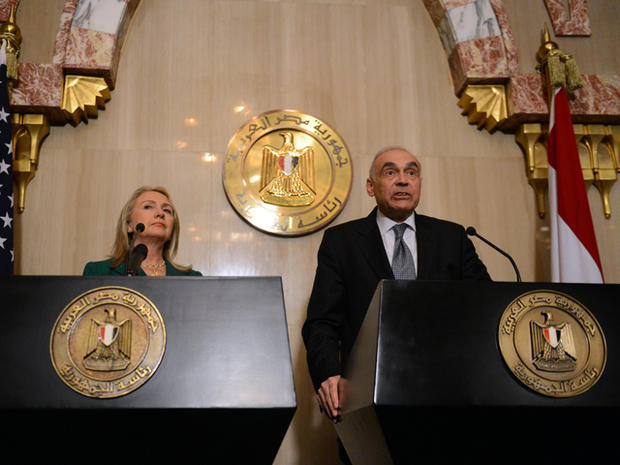Analysis: Success of Mideast cease-fire demands patience and forward-looking approach rare in the region
TEL AVIV Making the cease-fire between Israel and Hamas actually work -- and last -- may be a task that requires the wisdom of Solomon and the patience of Job.
The agreement is based on deep mutual mistrust, carries no signatures, and comes with warnings from both sides that their fingers remain on the trigger.
History teaches us that it won't likely hold forever. All that has been achieved, for certain, is "quiet for quiet." However, if both sides can manage to act in their own best self-interest and exercise political maturity and restraint, keeping their eyes on the long-term, it could actually turn out to be a win-win, and something to build on.
- U.S. skeptical of Mideast cease-fire prospects
- Complete coverage: Crisis in Gaza
- Fragile Mideast cease-fire takes hold
Hamas' new standing
Israel claims to have "crippled Hamas's military power" with eight days of missile strikes on the Palestinian territory. It's worth noting, however, that pretty much the same boast was made after the 2009 invasion of Gaza. If the truce is to hold, that boast had best not be true this time, either.
Israel signed the cease-fire deal on the tacit understanding that Hamas will control the even more militant factions inside the Gaza Strip.
Islamic Jihad -- which Iran says it has supplied with technology to make the rockets that have now, for the first time, made it to the outskirts of Tel Aviv and Jerusalem -- crowed that it used only a fraction of its capabilities and arsenal. The group also says it remains committed to what it terms, "the path of Jihad and resistance."
Hamas' own charter is based in part on the Quixotic aim of destroying the state of Israel. The new realities demonstrated by the negotiations which led to the cease-fire have shown, however, that the organization would be wise to leave that particular goal in the fine print for now.
As well-known commentator Chemi Shalev wrote in the Israeli newspaper Haaretz: "Hamas may not be interested in peace, but it could be capable, if it wishes, of delivering long-term security arrangements, which, contrary to peace, might possibly be attainable as well."
No militant movement can hope to beat Israel militarily. According to the latest figures available (2009), Israel's military expenditure was about £10 billion -- about $3 billion of which came in the form of military assistance from Washington. That is greater than the combined defense spending of its immediate neighbors Egypt, Syria, Jordan and Lebanon combined.
Hamas has emerged with an enhanced status in the Arab world. Maintaining it means finding new best friends.
Alliances old and new
Syria used to be the loudest Arab voice in support of Hamas. The cacophony of the discordant disintegration of the Assad regime has reduced that to a barely audible squeak.
Hamas must also be seen to be distancing itself from Iran, if it wants help proving its legitimacy in the region.
Qatar, the only Arab country willing to pour much need investment money into the Gaza Strip's moribund economy, has as much interest in seeing Iran's influence reduced as Israel does.
As a key architect and de-facto guarantor of the cease-fire, Egypt has everything to win and a lot to lose of it goes wrong. With aspirations to re-emerge as the leading light in the Sunni Arab world, Cairo has reason to grasp every opportunity to curtail Shiite influence -- which Iran epitomizes. The Gaza deal would seem to have put Egypt on the fast-track.
Announcing the cease-fire alongside Egyptian Foreign Minister in Cairo, U.S. Secretary of State Hillary Rodham Clinton praised the Egyptian government for "assuming the responsibility and leadership that has long made this country a cornerstone of regional stability and peace."
Minutes before the truce came into effect, Israeli Prime Minister Benjamin Netanyahu said he wanted "to express my appreciation for the efforts of Egypt to obtain a cease-fire."
Tomorrow's landscape
The jitters Mohammed Morsi's election to the Egyptian presidency sent through Israel may have been calmed for now, but they're being replaced by equally vexing, and perhaps harder to resolve issues.
To undercut the influence of the more radical factions in Gaza, Hamas must deliver not only peaceful skies, but economic prospects for its impoverished subjects.
It's a tall order, but if Hamas manages to pull it off, the combination of having been seen to force Israel to make a deal and improved economic conditions could add to its status and enhance the group's chances of overshadowing Fatah, which runs the West Bank, and which the Israelis see as the only "reasonable" Palestinian faction.
Hamas could end up superseding them, leaving Israel, and its backers, with a dilemma of almost biblical proportions.
Religion is often cited as being an integral part of the problems of the Middle East, especially the Israeli-Palestinian issue.
This time, however it might help if both Hamas and Israel looked to their sacred texts. Both the Jewish Torah and the Muslim Quran recognize Solomon and Job as prophets.
